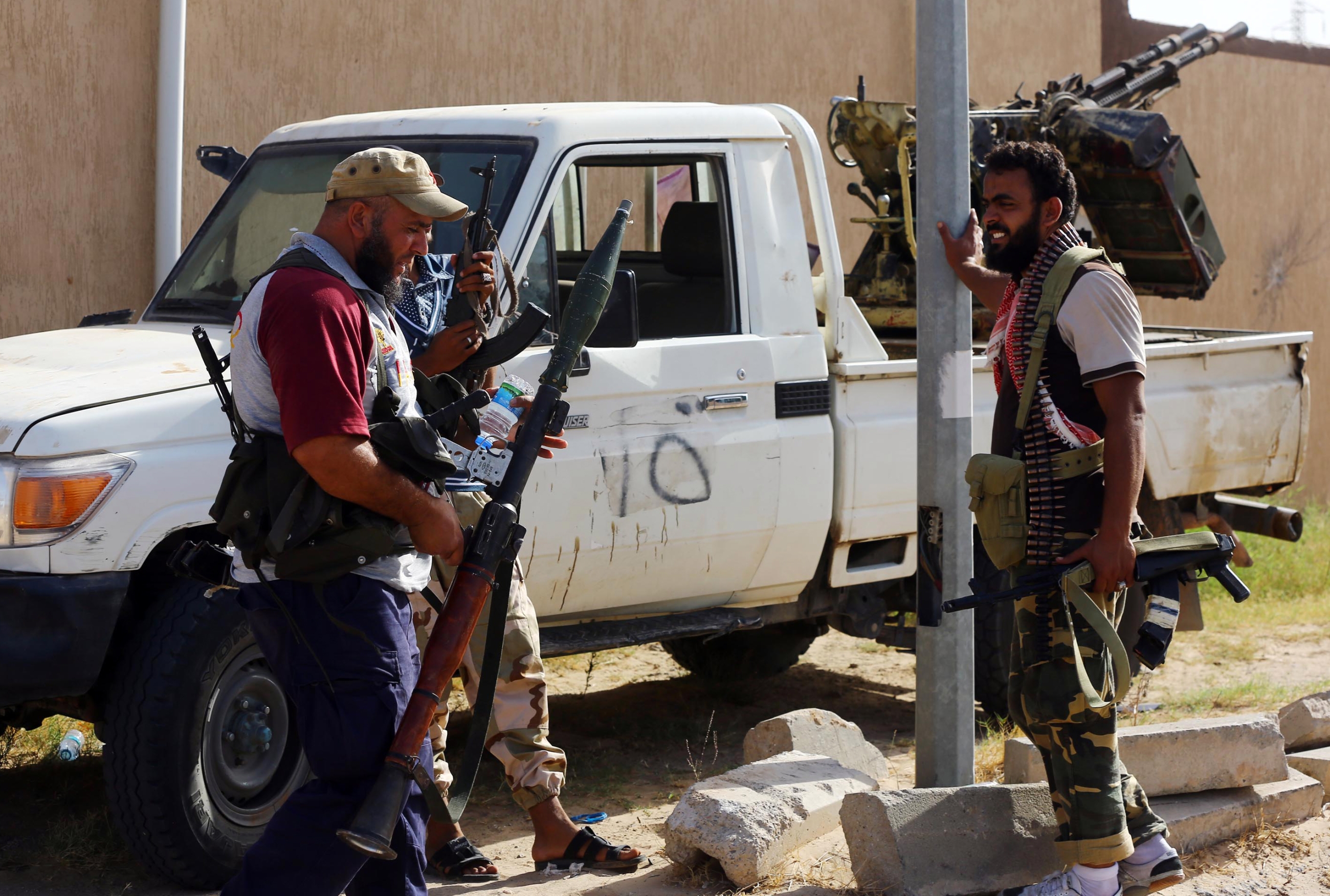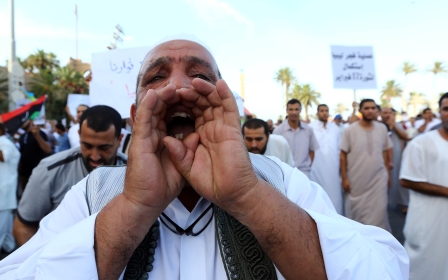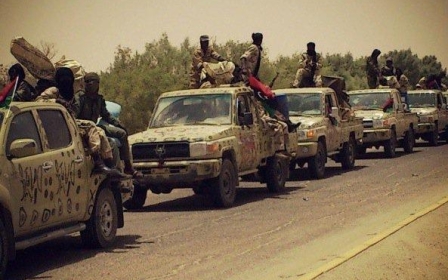The brewing battle for Benghazi

TOBRUK, Libya: Benghazi, where Libya’s revolution against the rule of Muammar Gaddafi began three years ago, is the focus of the new war between the victors of that revolution.
Libya Dawn, an alliance of Islamist and Misratan militias, has captured Tripoli to the west, while forces loyal to the House of Representatives are in control of Tobruk in the east. This division has placed Benghazi in the middle of the two rival factions and set the scene for a potentially decisive battle in Libya’s second city.
"In the port city of Benghazi, all the tribes existing in Libya are present,” said Ahmed Al Fitouri, a journalist and writer from Benghazi.
"That's why all the major historical changes in Libya started in Benghazi. Whoever controls Benghazi, will run the entire country."
Fighting has raged in the city since May when renegade general Khalifa Haftar attacked Islamist brigades in Benghazi, claiming that he was fighting terrorists.
Battles between the Islamists and Haftar’s militias allied with some army forces have continued ever since, with the front lines swinging wildly.
Libya’s small air force has launched air strikes on the Islamists, but despite this they have made gains, capturing four army bases and launching attacks on Benina airport, near Benghazi.
While the media often presents the conflict as a battle between Islamists and nationalists, the reality is more complicated. The Islamists enjoy support from several coastal tribes, and from Misrata, a coastal city 160 kilometers east of Tripoli.
The nationalists, in turn, are a coalition of regular army forces and tribal militias, which have pledged support to the newly elected parliament in Tobruk. The Islamist-led alliance has broken with that parliament, setting up its own rival administration in Tripoli, based around the former Islamist-led general national congress.
In Benghazi, the Islamist side is domination by an alliance between the Ansar Al-Sharia militia, and the pro-Muslim Brotherhood 17 February Brigade as well as Daraa Libya (Libya Shield) forces that are headquartered in the south west of the city.
On the other side are the irregular forces loyal to Haftar that are committed to fighting fundamentalist groups deployed in the south east of Benghazi. Haftar is also allied with two government army brigades, Saiqa (Lightening) and Zawiya Martyrs, and a brigade of Tobu soldiers from the southern town of Kufra.
For two weeks Ansar al-Sharia has been trying to capture Benina airport in fierce fighting that has seen the units advance to within two kilometers of the site.
But the fighting has been costly for Ansar al-Sharia and Saiqa forces fired artillery at the sites of their captured bases last week, destroying ammunition and guns that had been stored there by the Ansar forces.
Now the guns are silent, but residents fear new fighting is close - with the only question on everyone’s lips – which side will be the first to strike?
Fresh fighting?
"For two days I havn't hear clashes or Kalashnikov fire," said a woman living a few miles from the Ansar al-Sharia’s compound in the Benghazi district of Buttni.
"I fear that a massive attack is about to arrive soon," added the woman, who refused to reveal her identity for security reasons.
The woman said that one of her cousins joined Haftar’s forces a few days before.
"At home all our relatives cried, but I'm proud of him” she said. “Someone has to stop the fundamentalists."
It appears that Ansar al-Sharia and its allies are now waiting to launch another assault on Benina, 30 kilometers south of Benghazi.
The airport’s strategic importance is evident as soon as one looks at the map.
After a string of clashes last month in the west, Libya Dawn forces - led by Misrata militias – now control the main airports in that part of the country.
Tripoli International, the smaller Mitiqa military airport in the capitol, and a third airport in Misrata are all in Islamist hands.
The Islamist also appear to be in a strong position in the southern province of Fezzan where Misrata forces were deployed as peacekeepers early this year by then-prime Minister Zeidan who hoped they would pacify clashes between local tribes.
In Benghazi, Islamists are likewise strong, but they are also surrounded and need fresh ammunition and supplies from their allies in Tripoli. The best way to break this semi-blockade would be to get the supplies shipped in by air.
If Ansar al-Sharia can capture the airport and hold the city, the group will be able to cast a major blow to the Libyan parliament, which has been evacuated to Tobruk.
Once they control Benghazi, the Islamist forces will be free to push east to Bayda - home to both the national government and the constitutional commission - and then to Tobruk itself, home to its parliament.
Capturing Benina, however, is a hard mission.
Firstly, the airport lies on a hill overlooking the desert and flat lands which would be hard to cross without being spotted and provide little natural cover.
Secondly, the Benina district is controlled by four tribes bound together by an alliance cemented over the centuries that have all maintained a neutral position in the conflict so far but insist they will defend the airport against an attack by either side.
Thirdly, Haftar’s forces are also angling to take over the key site with some reports suggesting that they could stage an attack soon after they issued a “final warning” for Islamist forces to surrender their arms, or face an overwhelming attack earlier this week.
While Ansar forces have so far fared relatively well against Haftar, rumours have been circulating that Haftar is receiving help from outside.
Prime Minister Abdullah al-Thinni’s visit to the UAE this week has further fuelled speculation that the Gulf may be providing military assistance.
Last month, mystery jets bombed Tripoli, with the US issuing a statement linking Egypt and Abu Dhabi to the strike although it quickly backed away from the statements.
Internal war between the extremist militias
It is difficult to determine which side will win the day, with both sets of alliances suffering from their own internal divisions, as well as external constraints.
While Ansar al-Sharia rejects the constitution and the concept of democratic elections, its Libya Shield and 17 February Brigade allies both say they support the current system, at least in principle.
Libya Shield and the Justice and Construction Party - the Muslim Brotherhood’s political arm – also reject Ansar’s June declaration that Benghazi be regarded as an Islamic Emirate, with clashes reportedly breaking out between the Isalmist factions last month.
Ansar al-Sharia sources told North African online newspaper Magharebia that: "On Saturday, 9 August, fierce fighting took place between Ansar al-Sharia and the Central Shield led by Wisam Bin Humaid, resulting in the loss of seven people in their ranks."
JCP member Ahmed Fitouri also told Magharebia that, "terrorists like Ansar al-Sharia would not be allowed to return Libya to prehistoric ignorance and backwardness."
The Haftar threat has bound the brigades closer together in recent weeks, but it is unclear how long this period of internal cohesion will last.
There are also tensions between Hiftar’s militia, which he calls Libyan National Army, and the real national army, controlled by the government. Many soldiers support Haftar’s objective of removing Islamist militias, but say that they want to be led by regular army commanders and sometimes accuse Haftar of being loyal to Gaddafi.
Regional war
The prosepct of international intervention, which could tilt the balance, is also on the cards. While Haftar is at least tentatively backed by Egypt and the UAE, the Islamist side enjoys support from Turkey and Qatar. Sudan has also recently sent weapons to Libya, with the Libyan government saying that the weapons were destined for Libya Dawn in Tripoli.
France also looks increasingly likely to get involved and at the European defense ministers’ summit in Milan on 9 September, French Defense Minister Jean-Yves Le Drian said many parts of Libya were home to jihadist terrorist groups, saying: "We must act in Libya and mobilise the international community".
Last Monday, newly appointed United Nations Special Representative to Libya, Bernardine Leòn, began a round of meetings with what he called “the stakeholders” in Libya, trying to end the fighting but tensions remain high, with Benghazi still likely poised to become the next battlegroud in the war for Libya.
New MEE newsletter: Jerusalem Dispatch
Sign up to get the latest insights and analysis on Israel-Palestine, alongside Turkey Unpacked and other MEE newsletters
Middle East Eye delivers independent and unrivalled coverage and analysis of the Middle East, North Africa and beyond. To learn more about republishing this content and the associated fees, please fill out this form. More about MEE can be found here.




